#vista equity
Explore tagged Tumblr posts
Text
Navigating Uncertain Waters: What Acquisitions Like Jaggaer Being Acquired By Vista Equity Partners Means for the Procurement World
I was asked a pointed question - what will the ProcureTech landscape look like at the end of 2025. Here are my preliminary thoughts.
EDITOR’S NOTE: 75% of all solution providers will be gone by the end of 2025. Based on the above post, I was asked to provide a high-level overview of my take on the pending AI Bubble Burst and identify three companies I thought would emerge relatively unscathed and whole. As I am not generally a fan of the M&A game—or, as I call it, market share grabs to boost portfolios with replaceable parts,…
0 notes
Text
Robert Smith's Vista Equity Partners Makes History with Record-Setting Acquisition of Datto
Written by Delvin In 2018, the business world witnessed a historic moment as Robert Smith’s Vista Equity Partners made headlines with a remarkable acquisition. They acquired a majority stake in Datto, a prominent provider of IT solutions for small businesses, for an astounding $1.5 billion. This landmark deal not only solidified Vista Equity Partners’ position as a key player in the industry but…
View On WordPress
0 notes
Text
Invisible cities
How do we deal with droughts and floods? How can we live in human and non-human community, with equity, comfort, and safety? We must tread lightly, our footsteps gentle

About a year ago, I published my first contribution to this lush dream-action tree called SUMAÚMA. After asking permission to come in, I began our conversation with these words: “Though I was born in a bustling city and have lived in other cities throughout my life, in the end, men and women of wisdom, Indigenous and non-Indigenous alike, taught me to recognize an undeniable truth: cities are the downfall of the forest. Like any illusion that muddles figure and background, once you have seen the downfall, you can’t unsee it.” Just as time is a spiral in the conversation of Beiradeiros, I have wound my way back to the topic.
I used to like the city, any city. I was born in the planned perpendiculars of Brasília, where I learned to move among vistas of buildings, trees, and clouds. As I grew up, I became aware of the urban chaos brewing in Taguatinga and Ceilândia, the Federal District’s main satellite cities, as well as in the metropolises I visited on vacation: Belo Horizonte, Rio de Janeiro, and Recife. Impressive cities, frightening in their unplanned disorder, but powerful in the wonderful confluences of people they promote.
Then came Goiânia, São Paulo, Salvador, Buenos Aires, Santiago do Chile, La Paz, Quito, Bogota, Letícia, Tabatinga, Tefé, Manaus, New York, Mexico City, São Luís, Natal, and so many other cities on and outside the American continent — or Abya Yala, which in the Kuna language means “land of lifeblood.” Despite all the urban noise, filth, stench, mess, and risks, despite all the rude, annoying, and intolerable people, I always saw cities as rich in knowledge, vibrant centers of living culture, vortexes of symbolic exchange.
I appreciated the fact that the architecture and urban design of every city, each in its own way, reflected the legitimate history of the people who lived there. I believed that no matter how decaying or decrepit a city might be, each had its own charm, vigor, and indisputable worth. Attempting to live without cities seemed impossible, and in fact undesirable. That’s what I thought. Or, better put, how I felt.
Until I met Ailton, our beloved Master Krenak, who through friendship and truth has helped so many to stop illuding themselves about the critical situation of this planet. The first time Ailton and I spoke, it was like an earthquake struck my brain. Sharp as a wasp and patient as a tortoise, Ailton wreaked havoc with my optimism, rooted in scientism. Everything shook, and my ideas shifted places. Not a shift in what I thought about but in my very way of thinking, derailed, deranged, and thus finally sane. Not a change of opinion but of perspective. A disruptive arrow shot into the heart of unreason.
Continue reading.
#brazil#brazilian politics#politics#environmental justice#indigenous rights#image description in alt#mod nise da silveira
5 notes
·
View notes
Text
Black inventors

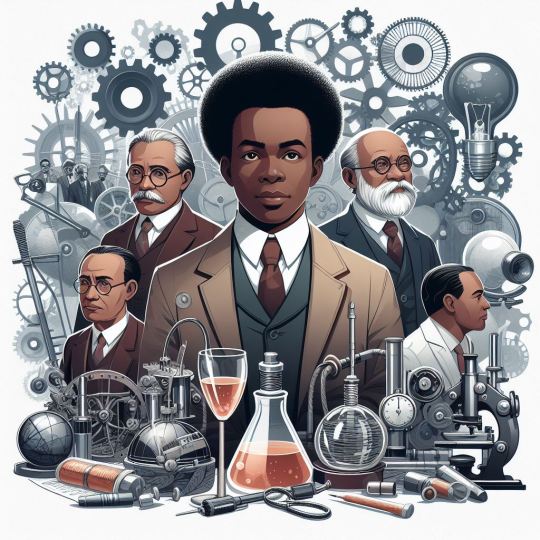



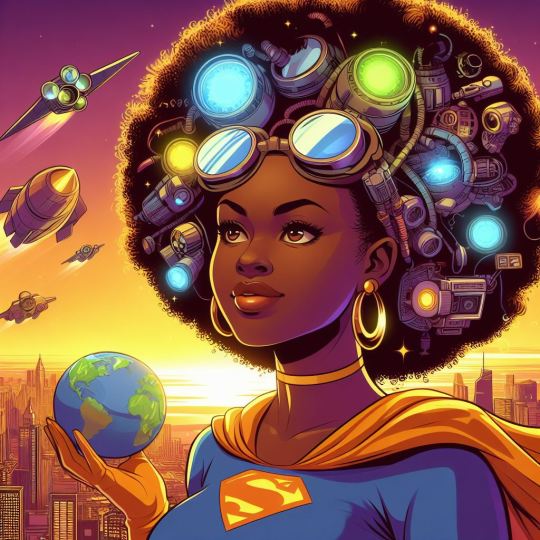
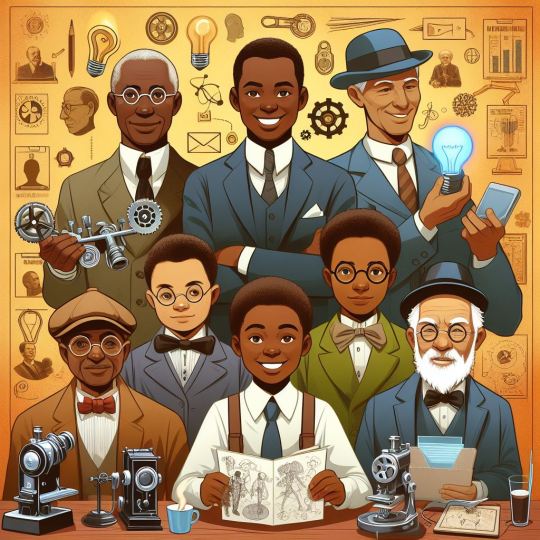







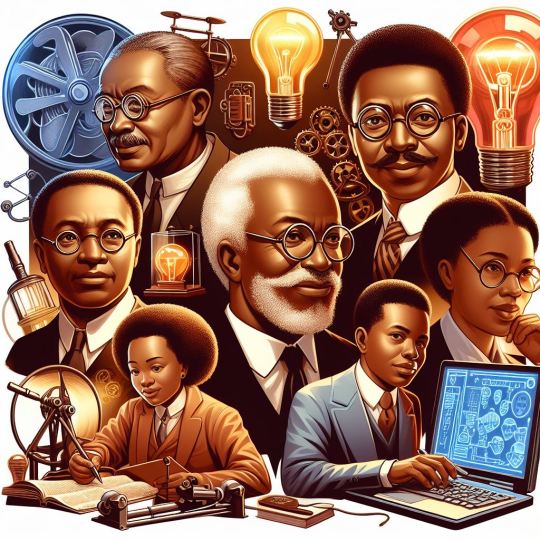
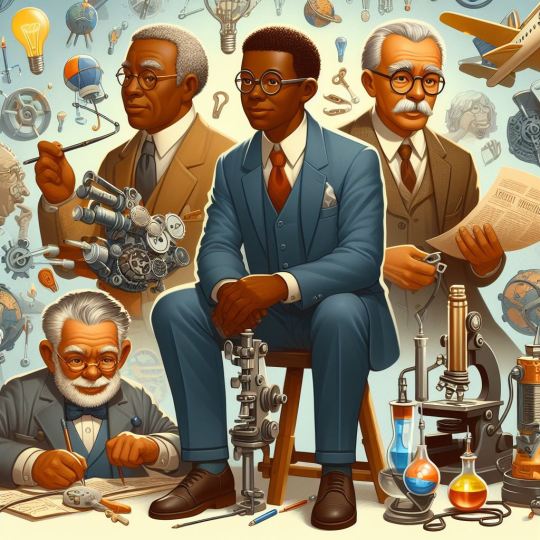




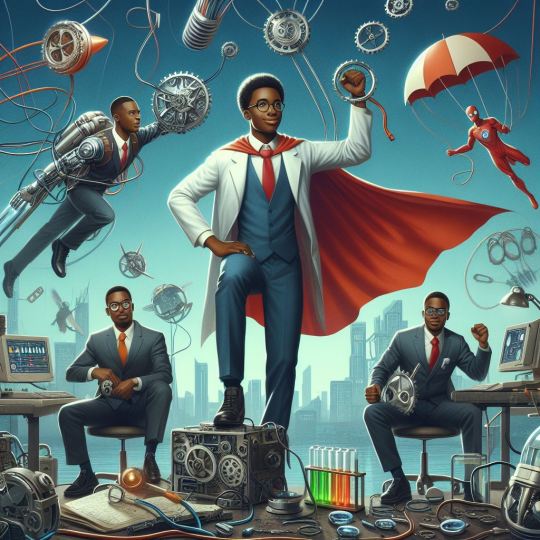









From Perplexity:
Famous black inventors have significantly contributed to various fields, from everyday household items to groundbreaking technological advancements. Here are some notable figures:
George Crum (1824-1914): A chef who is credited with inventing the potato chip in 1853[1].
Frederick McKinley Jones (1893-1961): Developed refrigeration equipment for trucks, trains, ships, and planes, receiving over 40 patents. His invention, the Thermo King, revolutionized the food and medical transport industries[1].
Granville T. Woods (1856-1910): Accumulated almost 60 patents, improving railroad functioning. Notably, he invented the induction telegraph system for train communication[1].
George Washington Carver (1864-1943): An agricultural chemist who developed 518 products from peanuts and sweet potatoes, including ink, dye, soap, and synthetic rubber[1].
Madam C.J. Walker (1867-1919): Became the first African American woman self-made millionaire by creating a line of hair products for African American women[1].
Garrett Morgan (1877-1963): Invented the traffic signal and a safety hood that served as a prototype for the gas mask[1].
Mary Beatrice Davidson Kenner: Patented the sanitary belt in 1957, a significant advancement in women's health and hygiene[1].
Thomas L. Jennings (1791–1859): The first African American to receive a U.S. patent, for a dry-cleaning process[4].
Patricia Bath (1942-2019): Invented a laser cataract treatment, becoming the first African American female doctor to receive a medical patent[4].
Mark Dean (1957-present): Holds over 20 patents, including contributions to the creation of the color PC monitor and the first gigahertz chip[4].
Elijah McCoy (1844-1929): Known for his invention of the automatic lubricator for oiling steam engines, leading to the phrase "the real McCoy" to denote something authentic[4].
These inventors have left a lasting impact on society, demonstrating ingenuity and perseverance in the face of challenges.
Citations: [1] https://www.oprahdaily.com/life/work-money/g30877473/african-american-inventors/ [2] https://www.parents.com/kids/education/world-changing-black-inventors-that-every-kid-should-know-about/ [3] https://www.black-inventor.com [4] https://www.biography.com/inventors/g46697619/famous-black-inventors [5] https://en.wikipedia.org/wiki/List_of_African-American_inventors_and_scientists
From Gemini (formerly Bard):
20 Famous Black Investors with Short Descriptions:
Dr. Shirley Jackson: First Black woman to earn a doctorate in nuclear physics, invested in research and development for the U.S. Department of Defense.
Robert F. Smith: Founded Vista Equity Partners, a private equity firm with over $85 billion in assets under management. Known for his philanthropic endeavors.
Oprah Winfrey: Media mogul and investor, known for her investments in cable channels, production companies, and Weight Watchers.
Udayan I. Lekhraj: Founded CMG Partners, a private equity firm specializing in healthcare investments. Advocate for diversity and inclusion in venture capital.
Catherine Hughes: Founded Urban One, a media company serving the African American community. First Black woman to chair a publicly traded company in the U.S.
Rodney Bryant: Co-founded JUST Capital, a firm that measures and incentivizes corporations to prioritize stakeholder capitalism.
Ellen Johnson Sirleaf: Former President of Liberia, Nobel Peace Prize winner. Focused on economic development and investment in her country.
Ronald Lauder: CEO of Estee Lauder Companies, known for his investments in the beauty industry and philanthropic work.
Charles R. Bronfman: Chairman of The Seagram Company Ltd., invested in various industries including entertainment, real estate, and philanthropy.
John Rogers Jr.: Founded Ariel Investments, a mutual fund company with over $28 billion in assets under management. Advocate for responsible investing.
Marc Morial: Former mayor of New Orleans, currently president of the National Urban League. Focused on economic empowerment of Black communities.
Ronald Watkins: Founding CEO of Watkins Investing Group, invests in real estate and businesses within the Black community.
Melody Hobson: President and CEO of Ariel Investments, known for her work on financial literacy and diversity in boardrooms.
Aisha Evans: Founded BE Capital, a venture capital firm focused on Black and Latinx tech entrepreneurs.
Kevin Hart: Comedian and investor, known for his investments in production companies, streaming platforms, and sports teams.
Jay-Z: Rapper and entrepreneur, known for his investments in music streaming, sports teams, and venture capital funds.
Will Smith: Actor and investor, known for his investments in production companies, media platforms, and venture capital funds.
Serena Williams: Tennis champion and investor, known for her investments in venture capital funds focused on women and diverse founders.
Rihanna: Singer and entrepreneur, known for her investments in beauty brands, fashion lines, and technology startups.
LeBron James: Basketball player and investor, known for his investments in media companies, production companies, and technology startups.
Please note: This list is not exhaustive and can be debated in terms of individual importance and impact.
Reading List on Black Inventors:
Black Inventors: Lives That Mattered by Darlene R. Medford
Hidden Figures: The American Dream and the Untold Story of the Black Women Mathematicians Who Helped Win the Space Race by Margot Lee Shetterly
Lifting the Veil: Celebrating the Unsung Heroes of Black History by Michael Hill
Lost Genius: The Forgotten Black Inventors Who Changed the World by Dennis Freeman
Pioneering Women in American Mathematics: From Agnes Scott to Emmy Noether by Pamela Prochazka
Black Inventors in Science and Technology by Shirley J. Smith
A Colored Man's Reminiscences of James M. Whitfield: With Recollections of the Early Struggles of Colored Men in Boston by Wilbur H. Siebert
Inventing the Future: Black Inventors in Science and Technology by Geneva Gay
African Americans in Science, Math, and Invention by Darlene R. Medford
Black Inventors in the United States by Darlene R. Medford
This list offers a variety of books covering different periods and areas of innovation by Black inventors. Consider exploring further based on your specific interests.
I hope this information is helpful!
#african american history#black history month#black history month 2024#dalle3#midjourney#black inventors#blackhistorymonth#africanamericanhistory#afrofuturism#solar punk#steampunk
15 notes
·
View notes
Photo

Robert Frederick Smith (born December 1, 1962) is a businessman, philanthropist, chemical engineer, and investor. He is the Founder, Chairman, and CEO of private equity firm Vista Equity Partners. In high school, he applied for an internship at Bell Labs but was told the program was intended for college students. He persisted, calling each Monday for five months. When a student from M.I.T. did not show up, he got the position, and that summer he developed a reliability test for semiconductors. He earned a BS in chemical engineering from Cornell University. He became a brother of Alpha Phi Alpha. He received his MBA from Columbia University with concentrations in finance and marketing. He worked at Goodyear Tire and Rubber Company, Air Products & Chemicals, and Kraft General Foods as a chemical engineer, where he registered two US and two European patents. He worked for Goldman Sachs in technology investment banking, first in New York City and then in Silicon Valley. He advised on mergers and acquisition activity with companies such as Apple and Microsoft. He was included in Vanity Fair’s New Establishment List, which is an annual ranking of individuals who have made impactful business innovations. He founded Vista Equity Partners, a private equity and venture capital firm of which he is the principal founder, chairman, and chief executive. He is credited with generating a 30 percent rate of return for his investors from the company's inception to 2020. Vista Equity Partners was the fourth largest enterprise software company after Microsoft, Oracle, and SAP, including all their holdings. Vista has invested in companies such as STATS, Ping Identity, and Jio. Vista Equity Partners had closed more than $46 billion of funding. He was named Private Equity International's Game Changer of the Year for his work with Vista. The 2019 PitchBook Private Equity Awards named Vista Equity Partners "Dealmaker of the Year". #africanhistory365 #africanexcellence #alphaphialpha https://www.instagram.com/p/Cln7GS2rUMf/?igshid=NGJjMDIxMWI=
3 notes
·
View notes
Text
The World's Richest Black Family: It's Not Who You Think!
The World's Richest Black Family: It's Not Who You Think! https://www.youtube.com/watch?v=XgFXjwAGv7U Welcome to Black Discoveries, where we go into the incredible stories of success and wealth within the Black community. In today's video, we're uncovering the truth behind the title "The World's Richest Black Family: It's Not Who You Think!" You might assume it's Michael Jordan's family, worth an impressive $3 billion. Or perhaps Jay-Z and Beyoncé, with their combined net worth of $2.6 billion. And who could forget Oprah Winfrey, the media queen, whose family is worth $3.76 billion? However, the actual titleholder will surprise you. Meet Robert F. Smith and his family, with a staggering net worth of $9.2 billion! As the CEO of Vista Equity Partners, Robert Smith is not only a wealthy businessman but also a renowned philanthropist. Discover how this remarkable family reached the pinnacle of financial success and continues to influence and inspire the world. In this video, we'll explore: • The journey of Robert F. Smith and his rise to becoming the richest Black family in the US. • Comparisons with other notable wealthy Black families. • Insights into the lifestyle and philanthropic efforts of the Smith family. Join us for an in-depth look inside the life of America's richest Black family. Don't forget to like, comment, and subscribe to Black Discoveries for more inspirational stories about wealth, success, and Black history. Stay tuned and be inspired by the incredible stories of success within the Black community, only on Black Discoveries! via Black Discoveries https://www.youtube.com/channel/UCTNr0N__QwstBhgCtvQcjhA November 25, 2024 at 06:48AM
#blackdiscoveries#policeaccountability#childtrafficking#humantrafficking#nancymace#whiteprivilege#trump#jasminecrockett
0 notes
Text
The world may offer us the same sunrise, but not everyone wakes to the same horizon. For some, the day begins with endless vistas of possibilities; for others, it begins behind locked doors. True equity is not in the chance to exist but in the fight to unlock those doors for all.
0 notes
Text
Inheriting a home from a loved one can be a mixed experience. You might feel overwhelmed with the decision to rent, sell, or move in. Here’s what you need to consider for each option:
1️⃣ Selling the Property
Benefits:
• Immediate access to cash.
• No ongoing maintenance or property management hassles.
• Use the proceeds for other investments or debts.
Challenges:
• May face capital gains tax.
• Emotional attachment can make it hard to decide.
• Current market conditions may impact the sale price.
Resources: Market analysis, home prep tips, and marketing strategies to get top dollar. 🏠💵
2️⃣ Renting the Property
Benefits:
• Generates passive income 💰.
• The property can appreciate over time.
• Tax benefits like depreciation and interest deductions.
Challenges:
• Dealing with tenants and potential property management headaches.
• Maintenance costs and potential vacancy periods.
• Need to ensure compliance with local rental laws.
Resources: Property management services, lease agreements, and rental market analysis to determine potential income. 📊
3️⃣ Moving In
Benefits:
• No need to worry about selling or renting out the property.
• You can turn it into your primary residence.
• Potential to qualify for homeowner exemptions and tax benefits.
Challenges:
• Potential costs of repairs and renovations 🛠️.
• May involve changes in your personal or family plans.
• Property may be far from your current job or social circle.
Resources: Access to contractors, financial planning advice, and home equity loans for any renovations.
🔑 Need help deciding? Let’s talk about the best options for your unique situation!
Gilbert Gomez Realtor
📞 Call me at (619) 366-7464 or visit our office at 3450 Bonita Rd, Unit 204, Chula Vista, CA 91910.
🏠💬 Whether you choose to sell, rent, or move in, I’m here to help you navigate the process seamlessly!
#InheritanceTips #SanDiegoRealtor #SellOrRent #HomeOwnership #GilbertGomezRealtor #RealEstateAdvice #InvestmentProperty #SanDiegoLiving
0 notes
Text
Rajasthan Tourism Unveiled: IBEF as Your Gateway to the Desert State
Unveil the wonders of Rajasthan Tourism with IBEF, your essential companion to the desert state. From the golden sands of Jaisalmer to the royal palaces of Jaipur, IBEF provides hassle-free access to iconic destinations. Explore vibrant cultures, historic landmarks, and breathtaking landscapes with ease. IBEF offers exclusive deals and personalized services that enrich your travel experience. Trust in the reliability supported by the India Brand Equity Foundation to explore Rajasthan’s hidden gems. Let IBEF be your gateway to a mesmerizing journey through Rajasthan’s rich heritage and stunning vistas.
#RajasthanTourism#ExploreRajasthan#VisitRajasthan#GDPRajasthan#RajasthanEconomy#IndustriesInRajasthan#RajasthanIndustries#TradeInRajasthan#AgricultureInRajasthan#RajasthanFarming
1 note
·
View note
Text
Estratégia de Conteúdo e presença digital

Hoje, mais do que nunca, uma estratégia de conteúdo e presença digital eficaz é fundamental para o sucesso de qualquer marca. Não se trata apenas de estar online ou postar regularmente, mas de construir uma narrativa autêntica que fortaleça o posicionamento da marca e engaje seu público de maneira relevante e significativa. Em um cenário digital altamente competitivo, a diferença entre ser lembrado ou esquecido está na capacidade da marca de gerar valor por meio de conteúdos que se conectam com as pessoas.
A presença digital é a nova vitrine da marca. Através de cada post, artigo, vídeo ou interação, uma marca comunica sua essência e seus valores. No entanto, o sucesso dessa presença vai além da quantidade de conteúdo produzido — ele reside na qualidade e na relevância do que está sendo entregue. Uma boa estratégia de conteúdo começa com a compreensão profunda do público-alvo: o que ele busca, quais são suas dores, interesses e, principalmente, como a marca pode resolver problemas ou melhorar a vida dessas pessoas. Conteúdo relevante, no momento certo e no canal adequado, é uma das formas mais poderosas de criar uma conexão emocional com o consumidor.
No contexto do branding, a criação de conteúdo ajuda a construir não apenas visibilidade, mas também autoridade e confiança. Quando uma marca entrega conteúdo consistente e de valor, ela passa a ser vista como uma referência, um ponto de apoio nas decisões do consumidor. Seja por meio de blogs, vídeos, podcasts ou redes sociais, o objetivo é sempre o mesmo: fazer com que o consumidor associe a marca a uma proteção confiável e acessível.
E não podemos esquecer da importância da interação. A presença digital não é uma via de mão única. A capacidade da marca de responder e se envolver com o público, criando conversas genuínas, também faz parte da construção de uma identidade forte no ambiente digital. Isso humaniza a marca, aproximando o consumidor de forma autêntica e demonstrando que, por trás das telas, há pessoas que ouvem e se importam.
Para profissionais de marketing e branding, construir essa estratégia exige planejamento, análise constante e uma visão de longo prazo. Uma marca que se destaca no ambiente digital é aquela que entende a importância de um conteúdo bem estruturado, capaz de inspirar, educar ou entreter, e que se adapta às mudanças no comportamento do público. Afinal, no digital, a presença de marca bem construída é um ativo positivo que pode influenciar diretamente o Brand Equity, gerando conexões mais profundas e fidelizando clientes a longo prazo.
0 notes
Link
#DESENVOLVIMENTOSUSTENTÁVEL#ECONOMIACIRCULAR#GESTÃODECARBONO#GESTÃOSUSTENTÁVEL#RECICLAGEM#RECICLAGEMDEPLÁSTICO
0 notes
Text
Top 10 richest black people in the world
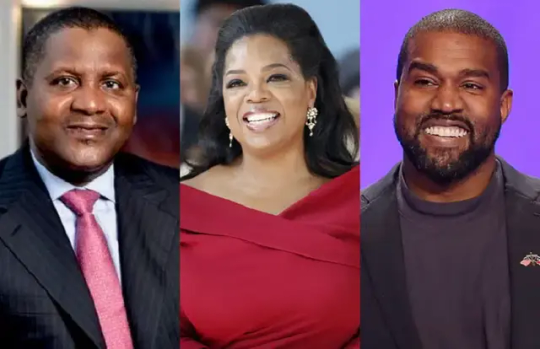
In a world where success is often measured by wealth, the richest Black people stand out as remarkable figures.
These individuals are pioneers in diverse fields, from business to entertainment, and their achievements not only shatter barriers but also pave the way for others to follow.
Take a look at the top 10 richest Black people in the world:
David Steward $11.4 billion USA
David Lloyd Steward, born in 1951, is an American billionaire entrepreneur. He is the founder and chairman of World Wide Technology (WWT), which is among the largest African-American-owned companies in the United States. In 2024, Steward was ranked 344th on Forbes’ list of billionaires globally, with an estimated net worth of $11.4 billion.
Aliko Dangote ($11.3 billion)
Aliko Dangote, born on April 10, 1957, is one of the richest Black people in the world. A prominent Nigerian businessman and industrialist, he is notably the first person to build a private oil refinery in Nigeria. As of October 2024, Forbes ranks him as the 211th richest person in the world, with an estimated net worth of $11.2 billion. According to the Bloomberg Billionaires Index, his wealth is estimated at $27.7 billion.
Robert F. Smith ($10.8 billion)
Robert Frederick Smith, born on December 1, 1962, is an American billionaire businessman and philanthropist. He is the founder, chairman, and CEO of Vista Equity Partners, a private equity firm. Smith earned a chemical engineering degree from Cornell University and later an MBA from Columbia Business School. Before founding his company, he worked as an investment banker at Goldman Sachs. In 2019, during a commencement speech at Morehouse College, Smith made headlines when he pledged to cover the entire $34 million in student loan debt for the graduating class of 2019.
Mike Adenuga ($6.6 billion)
Mike Adenuga, Nigeria’s second wealthiest person, amassed his fortune through telecommunications and oil ventures. His mobile network company, Globacom, is the second-largest in Nigeria, boasting over 60 million subscribers. In addition to telecommunications, Adenuga’s oil company, Conoil Producing, operates six oil blocks in the Niger Delta.
Globacom also established Glo-1, a 6,100-mile submarine internet cable linking the U.K. with Ghana and Portugal. Adenuga holds a 74% stake in publicly traded Conoil and owns just under 6% of Nigerian bank Sterling Financial Holding.
Abdulsamad Rabiu ($ 4.7 billion)
One of the richest Black people in the world, Abdul Samad Isyaku Rabiu is a prominent Nigerian businessman and philanthropist. As of 2024, he ranks as Nigeria’s third richest man. His father, Khalifah Isyaku Rabiu, was one of Nigeria’s leading industrialists in the 1970s and 1980s. Abdul Samad is the founder and chairman of BUA Group, a Nigerian conglomerate focused on manufacturing, infrastructure, and agriculture, generating over $2.5 billion in revenue. He also serves as the chairman of Nigeria’s Bank of Industry (BOI).
In July 2020, Forbes valued his net worth at $3.2 billion, placing him 716th among the world’s billionaires. By January 2022, he was recognised as Nigeria’s second richest person. In April 2022, he ranked as the fifth-richest person in Africa with a fortune of $6.7 billion, and by January 2023, he climbed to fourth on the continent’s wealthiest list.
Michael Jordan ($3.5 billion)
Widely considered the greatest basketball player of all time, Michael Jordan won six championships with the Chicago Bulls. Throughout his career, his total salary amounted to $90 million, but his earnings from partnerships with brands like Nike, Hanes, and Gatorade have reached an astounding $2.4 billion (before taxes). In 2020, Jordan became a special advisor and investor for the sports-betting company DraftKings and also co-owned a NASCAR team. In 2023, he sold his majority stake in the Charlotte Hornets in a deal that valued the NBA team at $3 billion.
Oprah Winfrey ($3 billion)
Oprah Winfrey turned her 25-year-long talk show into a powerful media and business empire. The profits from her show, combined with earnings from films like ‘The Color Purple’, ‘Beloved’, and ‘Selma’—which were co-produced by her company, Harpo Productions—have brought her wealth to an estimated $2.5 billion.
In 2011, she launched the OWN cable channel and later sold most of her shares in it to Warner Bros. Discovery in 2020, receiving company stock in return.
In 2015, Winfrey purchased a 10% stake in WeightWatchers, and in 2024, she generously donated her shares to the Smithsonian’s National Museum of African American History and Culture.
Winfrey also owns an extensive real estate portfolio, including homes in California and more than a dozen properties, along with 2,100 acres of land in Hawaii.
Patrice Motsepe ($3 billion)
Patrice Motsepe, founder and chairman of African Rainbow Minerals, became a billionaire in 2008, making history as the first Black African to appear on the Forbes billionaire list. In 2016, he established African Rainbow Capital, a private equity firm focused on investments across Africa. Motsepe also holds a stake in Sanlam, a publicly traded financial services company, and is the owner and president of the Mamelodi Sundowns Football Club.
In March 2021, he was elected president of the Confederation of African Football (CAF), the governing body for soccer on the continent. His business journey began in 1994 when he became the first Black partner at Johannesburg law firm Bowman Gilfillan, later launching a mining services company. In 1997, Motsepe acquired underperforming gold mine shafts, which he successfully turned around
Jay-Z ($2.5 billion)
Since becoming hip-hop’s first billionaire in 2019, Jay-Z has significantly increased his wealth, largely due to his successful liquor ventures. In 2021, luxury conglomerate LVMH acquired a 50% stake in his champagne brand, Armand de Brignac, also known as Ace of Spades. In February 2023, he sold a majority of his ownership in his cognac brand, D’Usse, to Bacardi.
Beyond liquor, Jay-Z’s wealth includes assets like an art collection featuring works by Jean-Michel Basquiat, his extensive music catalog, and stakes in companies such as Block and Uber. In 2021, he was inducted into the Rock & Roll Hall of Fame, and in 2022, he won an Emmy for producing the Super Bowl Halftime Show.
Strive Masiyiwa ($1.8 billion)
Strive Masiyiwa faced huge government resistance when he launched the mobile phone network Econet Wireless Zimbabwe in his home country in 1998. He holds a 38% stake in the publicly traded Econet Wireless Zimbabwe, which is part of his larger Econet Group, as well as about 33% of EcoCash, a mobile money transfer company.
Masiyiwa also has an investment in Liquid Intelligent Technologies, a private firm that offers fiber optic and cloud services to telecom companies throughout Africa. His portfolio includes investments in fintech and power distribution companies across the continent, along with stock options in Netflix, where he has been a board member since December 2020. He and his wife, Tsitsi, founded the Higherlife Foundation, which assists orphaned and underprivileged children in Zimbabwe, South Africa, Burundi, and Lesotho.
1 note
·
View note
Text
After selling Drift, ex-HubSpot exec launches AI for customer success managers
Elias Torres has achieved a lot for somebody who immigrated to the US from Nicaragua at 17 without knowing any English. He served as a VP of engineering at HubSpot before co-founding Drift, a company that sold to Vista Equity for about $1.2 billion in 2021. “It’s very rare to get this far, but I’m […] © 2024 TechCrunch. All rights reserved. For personal use only. Source: TechCrunch After selling…
0 notes
Text
Después de vender Drift, el ex ejecutivo de HubSpot lanza IA para gerentes de éxito del cliente
Elías Torres ha logrado mucho para alguien que emigró a los Estados Unidos desde Nicaragua a los 17 años sin saber nada de inglés. Se desempeñó como vicepresidente de ingeniería en HubSpot antes de cofundar Drift, una empresa que vendió a Vista Equity por alrededor de 1.200 millones de dólares en 2021. “Es muy raro llegar tan lejos, pero aún no he terminado”, dijo Torres a TechCrunch. Hace…
0 notes
Text
Very excited about 2025 as an IPO year, says Vista Equity's Ashley MacNeill
youtube
MARCEDRIC KIRBY FOUNDER CEO.
MARCEDRIC.KIRBY INC.
WELCOME TO THE VALLEY OF THE VAMPIRES
We are working on getting Starbucks to host a game off Playstation Xbox Google and Metaverse etc.... coming soon
0 notes